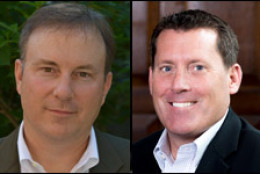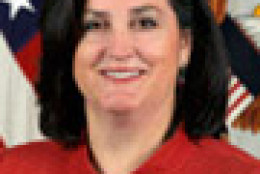Army
-
As one of the military's highest-ranking women and its first openly gay general, Brig. Gen. Tammy Smith, has a busy speaking calendar, especially around this time of year. It's women's history month. Smith is the deputy chief of staff of the Army Reserve, which prides itself on having women in 95 percent of its occupations. Federal News Radio Reporter Emily Kopp asked Smith whether she thought the Army Reserve was more welcoming to women than other parts of the military.
March 19, 2015 -
Two priorities shape the way the United States Army will drive its business: Warfighting and enterprise information environment mission areas. Those priorities are more important in an Army where human power, and budget, is getting smaller. Doug Wiltsie is program executive officer for Enterprise Information Systems for the Army. On In Depth with Francis Rose, Doug laid out three priorities for 2015 and he says the first one is uninterrupted capability delivery.
March 18, 2015 -
You might remember Charla Nash. She's the woman who was horribly disfigured when attacked by a friend's pet chimpanzee back in 2009. The Pentagon has been closely watching her long recovery. More than watching, actually. The Army has paid hundreds of thousands of dollars of Nash's medical bills. The hope is Nash's ordeal can help the military learn to care for disfigured soldiers returning from war. Dr. Wendy Dean, a medical advisor in the Army's Tissue Injury and Regenerative Medicine Program Management Office, joined Tom Temin on the Federal Drive with more on the effort and what the military hopes to learn.
March 17, 2015 -
Under a new agreement, GSA would reduce the Army's fee to use the professional services governmentwide acquisition contract to 0.1 percent from 0.75 percent. This is the second major MOU signed by GSA and a military service.
March 17, 2015 -
Cuts to service contracts are part of an Army-wide push to use soldiers and civilians for jobs that had been outsourced by necessity during wartime, officials said Wednesday.
March 12, 2015 -
The military already has shown it can improve services on bases through public-private partnerships. As budgets shrink, the next task is to partner with local governments.
March 11, 2015 -
Dave Gwyn and Chris Howard, vice presidents of Federal sales at Nutanix, join host John Gilroy to discuss how their company can help your agency move to cloud and consolidate its data. March 10, 2015
March 10, 2015 -
After two years of operating under sequestration level funding, the Army now faces a $3 billion maintenance backlog and 5,500 work orders, said Katherine Hammack, assistant secretary of the Army for installations, energy and environment.
March 05, 2015 -
The Defense Department will close 15 sites in Europe over the next two years. The Department expects the European Infrastructure Consolidation to save $500 million a year. Katherine Hammack is assistant secretary of the Army for Installations, Energy and Environment. On In Depth with Francis Rose, she shared the details on this and DoD's other cost-saving plans.
March 04, 2015 -
Cyber challenges are more prevalent than ever. That's driving the need for more people with the professional skills necessary to prevent and mitigate attacks. To that end, the Army Reserve has launched a new partnership to build its network of cyber warriors. The program is designed to train soldiers in cyber warfare — for both the Reserve and private sector employers. Lt. Col. Scott Nelson is the Army Reserve's Cyber P3 Program Manager. He joined the Federal Drive with Tom Temin with more on how it all works.
February 26, 2015 -
Bloomberg Government analysts Robert levinson and Cameron Leuthy join host Roger Waldron to to talk about what's in the fiscal year 2016 defense budget. February 24, 2015
February 24, 2015 -
Edward Snowden and Bradley Manning personify the concept of the insider threat. Defending against that threat is now one of the highest priorities for the military and intelligence communities. Retired Army Maj. Gen. Steven Smith is former chief information security officer for the Army. He's now Security Technology Adviser to Metalogix. Pat Park is vice president for public sector at Metalogix. On In Depth with Francis Rose, they explained how agencies can tackle the different types of insider threats.
February 19, 2015 -
The SES has lost its luster in recent years, in part because of constrained program budgets, increased scrutiny from Congress, and a sense among members that political appointees are assuming more of the leadership responsibilities once reserved for them. In part two of our special report, Fixing the SES, five Senior Executive Service members tell Federal News Radio why they choose to stay in the service, and why they believe the SES may have its faults, but it's not broken.
February 16, 2015 -
The Army is revisiting its approach to mission command and leaning on improved IT networks as one way to make its forces more flexible.
February 06, 2015 -
The Army's budget request details a branch in transition, from both a military and financial perspective.
February 05, 2015











